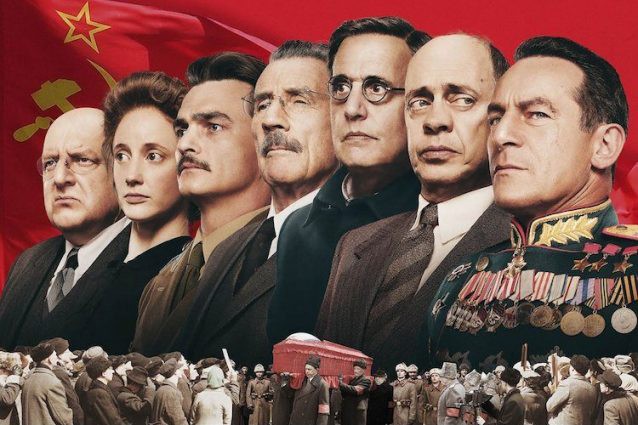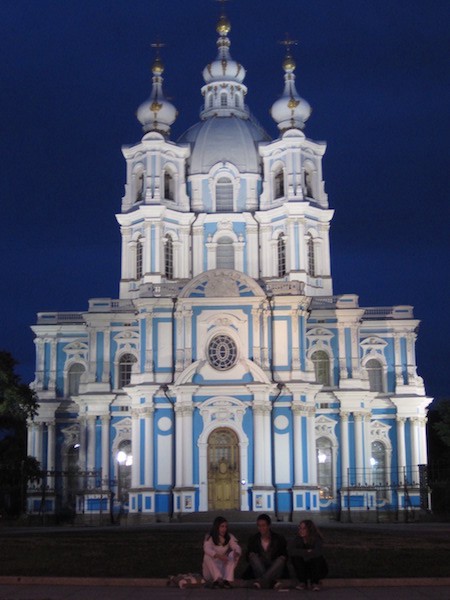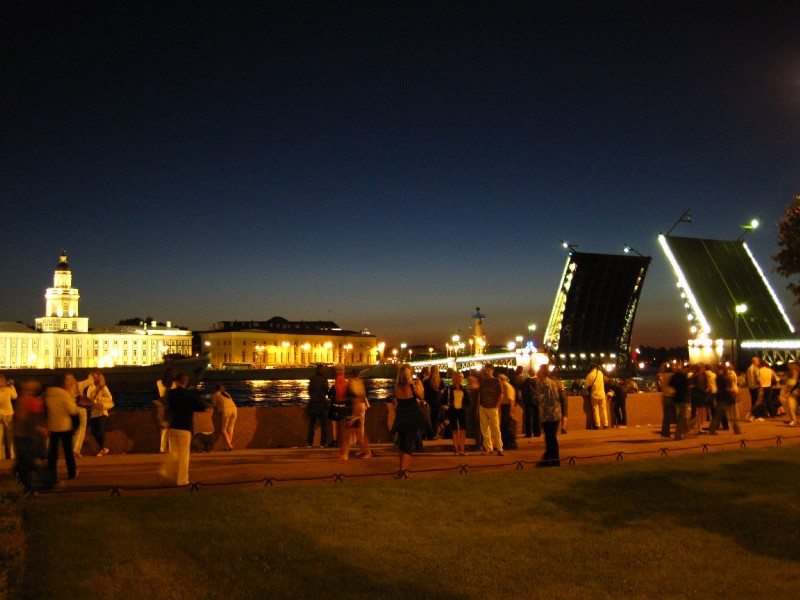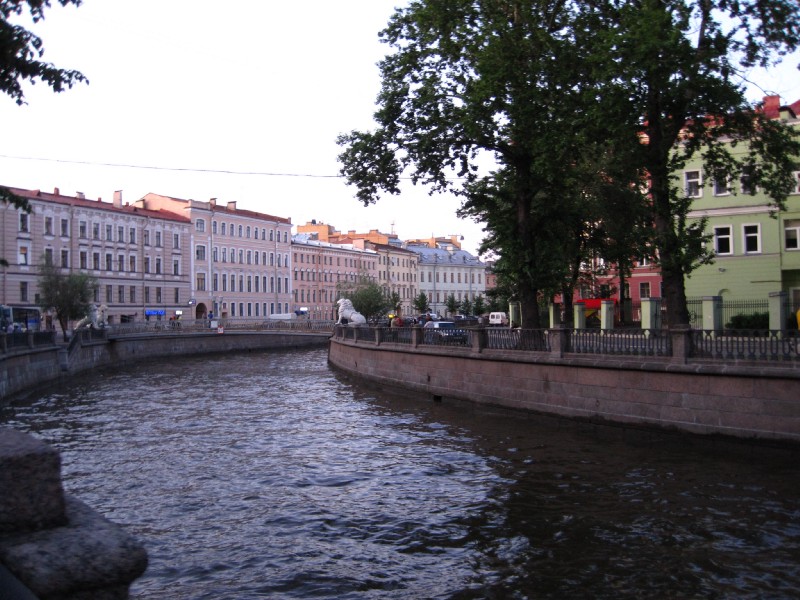Armando Ianucci’s The Death of Stalin was the funniest movie I’ve seen in theaters since San Andreas. If you thought Stalinism couldn’t be made comedic, then Armando Ianucci is here to prove you wrong. In fact, the well-known horrors of the Stalin regime is what gives this movie much of its power. Watching a bunch of puffy bald men squabble with Seinfeldian pettiness while ordering the executions of innocents makes you laugh in horror at the fact that you’re laughing in the first place.
As the title suggests, the story is all about the Soviet Politburo’s comical scramble for succession after the death of Joseph Stalin (Adrian McLoughlin). The closest thing the movie has to a hero is Nikita Khrushchev (Steve Buscemi) because he’s not indecisive and stupid like Georgy Malenkov (Jeffrey Tambor), but he’s also not conniving and evil like Lavrentiy Beria (Simon Russell Beale). You don’t have to know history to enjoy the movie and if anything, it may help if you don’t. I had no idea who Lavrentiy Beria was, but had I known he was the Soviet Heinrich Himmler, maybe I would’ve found it harder to laugh.

Speaking of the Nazis, could such a comedy have been made about them? Life is Beautiful was about trying to make the Holocaust palatable for a child, but it was precisely that: for a child. And the audience was expected to know the tragedy and monstrosity of it all. Charlie Chaplin tried to buffoonify Hitler with The Great Dictator with mixed results. What about mass killings in non-white countries? There are plenty that have happened in Asia, South America, and Africa. What would a similar comedy about Mao Zedong? Or Pinochet or Idi Amin? We’ve already seen how low it can with something like The Interview, a movie that only survived because of American audiences’ spite for North Korea giving them attitude.
Americans seem to have an oddly casual attitude towards massacred Russians. The tens of millions whose deaths led to Allied victory in World War II hardly register in Hollywood and other avenues of American cultural propaganda. Near where I live, there’s a bar called KGB, in ostensible honor of an institution that tortured and murdered countless people. I must be sounding like a Friedmanian Cold Warrior right now, which I’m not. I swear. But I do have to wonder if this movie could’ve been made about any other group of people. If not, it feels unfair, almost on a personal level.
Months ago, I got my first tattoo. It was something I’d been wanting to do for a while, but I had to make sure I had the right design first. In the meantime, I opted for a pierced ear. One night, as I was walking along the streets of Old City in Philadelphia, it came to me: a Russian firebird.
The Russian firebird, or zhar-ptitsa (жар-птица), isn’t quite like the phoenix most of us know about. The Russian firebird doesn’t actually breathe fire. That would explain why it always seems to be in captivity in the Russian fairy tales I’ve read. One rather confusing story I read involved three princes, golden apples, and a firebird’s feather, I think. My memory is hazy because I never finished it, because it was in Russian.
The tattoo was to commemorate a version of the Russian firebird fairy tale I once wrote as a 20-year old junior in college. I won a writing prize for it, something that had never happened to me before. Considering I was petrified of sitting still in a quiet place to ever write anything, that story was quite the accomplishment by my standards. That’s the challenge of being young and wanting to write; you’re not quite confident enough to bear the solitude.
The Early 20s version of Chris Lee was a bit of a mess, but winning that prize was the start of a much-needed maturation process. The tattoo was going to be my reminder that, as I approached the end of my 20s, that I should never be afraid of doing something just because trying could lead to failure.
It was no accident that the story that led to the tattoo was a mimicking of Russian folklore. I’ve always had a fascination with Russia. In high school, I had the ambition of writing a novel set in a faux-Tolstoyesque Russia. It involved Siberian cabins, an accidental patricide, musket wars, and an ending where the corrupted and betrayed protagonist would escape from a burning rebellious city with his newfound infant daughter in his arms. I made it to about page 25 before giving up.
Once I got to college, my concentration required a foreign language, so I chose Russian. In a campus environment that bombarded you with messages of “Do what you love!” (even if you had obligations of a first-born son of Korean immigrant parents), this was my adherence to that mantra. Russian basically had no practical purpose at that time and the whole department seemed wistful for the glory days of the Cold War. It almost felt as if Russian was a dead language only meant for the study of old texts, kind of like Latin without the dork baggage.
I had no personal connection at all to Russia. But there was something relatably sad about Russia. As I read about Peter the Great’s desperate attempts to Westernize his nation, this 2nd-generation Asian Canadian could relate. As dastardly as Putin is, when he seethes at how the West has humiliated his country in the past few decades, I can relate. In a society where minorities are forced to identify with Europeans, the Russians seemed to be the most like me. I grew to love their musicians, writers, and even their brutal wars, as much as wars can be “loved.” And no, I didn’t have some weird idealization of Russian girls.

Regrettably, I was never the most diligent student in college and my language skills were never that great. But they did reach their zenith in the summer I was in St. Petersburg. It was my first time in Europe and I’m glad it was in a city that most outsiders probably only visit via Baltic cruise. It still remains one of my favorite cities in the world.
St. Petersburg was modeled after Amsterdam, just one of many Western inspirations Peter the Great took. The city was built on land taken from the Swedes, whom we now may think of as affable Ikea builders with infinity family leave, but they used to lord over a mighty empire. The city’s construction was swift and brutal as many workers were sacrificed in literally draining the swamp. Alexander Pushkin’s poem “The Bronze Horseman” reflects this cruel reality.

Like Amsterdam, the city is full of waterways, small and large, that divide it into islands. At night, many of the bridges along the Neva River go up to allow larger ships to pass through. It will be hours before they come back down. Meanwhile, the metro shuts down right before midnight, or at least it did when I was there. This means that if you’re hanging out at night on an island you don’t live on, you have to stay out all night until the metro starts again or the bridges lower, unless you want to pay an expensive roundabout cab ride. My friends and I spent numerous all-nighters in bars and cafes, trying to pass the time until sunrise (remember, this was before the smartphone era and we all had primitive rental Nokias). Also, in the summer, the sun barely sets because St. Petersburg is the most northern major city in the world. You can emerge from an underground bar at midnight, only to be greeted by the white skies of an overcast afternoon.
People love to bash Russian cuisine, but it’s not that bad. I really can’t ever complain about a spread of herring, varenyky, halupki, beef stroganoff, and vodka. Except for borscht. I hate borscht. It reminds me of a Korean radish soup I hated growing up. Plus, when you add sour cream, it turns into a weird pink. Besides, the country is so diverse that you can opt for food from Georgia, Azerbaijan, Siberia, etc. There was one stand near my language institute that had the tastiest chicken shawarma I’ve yet eaten.

When I went there, Russo-American relations weren’t as bad as they are now. Obama’s election had caused a brief uptick in optimism over a “reset” in diplomacy. Granted, the Georgian invasion had already happened, but outlook was still upbeat. More worryingly for me (or at least my parents), there had been a few incidents of skinhead gangs murdering Asian international students. But I went anyway and didn’t experience any harrowing moments. It turned out that my homestay was right next to a park that was popularly used as a rallying point for Neo-Nazis. But maybe they got angrier during the dark winters, because I walked by that park every day without incident.
I do wonder if there was something fucked up in heavily identifying with a European culture. Can you ever do that innocently, as an Asian? I doubt it. But just a short while after being in Russia, I ended up living in Korea for two years (“White Christmas, White America”), which were probably the two most important years of my life. I like to think it was all part of a process.
I don’t expect to go back to Russia anytime soon, if ever. There’s just too much of the world left to see. And there are certain places of the world that’ll always be special because you went there as a dumb little 21-year old. Returning there might ruin that. But I still do feel a connection. In The Death of Stalin, the fourth movement from Tchaikovsky’s 6th symphony plays in the soundtrack and I was happy I could recognize it. I recently listened to Prokofiev’s “Romeo and Juliet” for the first time and just had to go see the ballet soon after. Even seemingly silly facts like Evgenia Medvedeva’s k-pop obsession makes me smile. My dream vacation would be to take the Trans-Mongolian Express from Vladivostok through Ulaanbataar to Moscow.
One day, I’ll do it.

Comments powered by Talkyard.